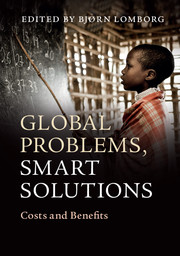Book contents
- Frontmatter
- Contents
- List of Figures
- List of Tables
- List of Contributors
- Acknowledgments
- Selected abbreviations and acronyms
- Introduction
- Part I The Solutions
- 1 Armed Conflicts
- 2 Ecosystems and Biodiversity
- 3 Chronic Disease
- 4 Climate Change
- 5 Education
- 6 Hunger and Malnutrition
- 7 Infectious Disease, Injury, and Reproductive Health
- 8 Natural Disasters
- 9 Population growth
- 10 Water and Sanitation
- 11 Corruption and Policy Reform
- 12 Trade Barriers and Subsidies
- Part II Ranking the Opportunities
- Conclusion: Making Your Own Prioritization
- Index
- References
1 - Armed Conflicts
Published online by Cambridge University Press: 05 June 2014
- Frontmatter
- Contents
- List of Figures
- List of Tables
- List of Contributors
- Acknowledgments
- Selected abbreviations and acronyms
- Introduction
- Part I The Solutions
- 1 Armed Conflicts
- 2 Ecosystems and Biodiversity
- 3 Chronic Disease
- 4 Climate Change
- 5 Education
- 6 Hunger and Malnutrition
- 7 Infectious Disease, Injury, and Reproductive Health
- 8 Natural Disasters
- 9 Population growth
- 10 Water and Sanitation
- 11 Corruption and Policy Reform
- 12 Trade Barriers and Subsidies
- Part II Ranking the Opportunities
- Conclusion: Making Your Own Prioritization
- Index
- References
Summary
I am grateful to Kasper Thede Anderskov, Jurgen Brauer, Anke Hoeffler, Guy Lamb, Bjørn Lomborg, Andrew Mack, Ron Smith, and an anonymous referee for comments and suggestions. The usual disclaimer applies.
Introduction: the problem
In each year of the 1980s and 1990s there were between thirty and forty major armed conflicts in progress, though over the 2000s active major armed conflicts have declined. In 2007, there were fourteen major armed conflicts active in thirteen locations around the world, nearly all of which were internal or interstate disputes over government or territory – civil wars. There was a wide variation in the intensity of these conflicts, from “low intensity” guerrilla–government conflicts to conflicts between relatively large and well-equipped armies. While there are less of them they tend to last longer and range from ideological struggles (Mozambique, Eritrea, Nicaragua) to more fragmented decentralized conflicts (Somalia and Rwanda), with many a mixture of both at any particular time. The nature of war has changed, with an increasing role for less formal armies, lack of battlefield engagement, and increased involvement of civilians as victims. There are now more states and more disputes, but still relatively few lead to war.
Information
- Type
- Chapter
- Information
- Global Problems, Smart SolutionsCosts and Benefits, pp. 21 - 71Publisher: Cambridge University PressPrint publication year: 2013
References
Accessibility standard: Unknown
Why this information is here
This section outlines the accessibility features of this content - including support for screen readers, full keyboard navigation and high-contrast display options. This may not be relevant for you.Accessibility Information
- 13
- Cited by
